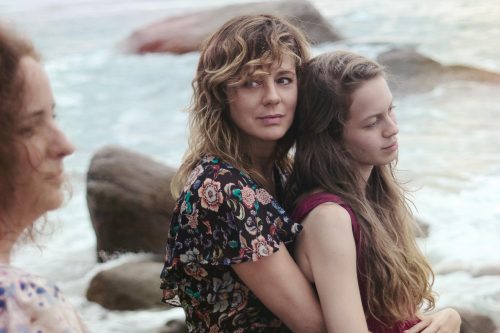AFI Fest 2017: April’s Daughter, by David Bax
In movies and in life, a baby is a living collection of potential ticking time bombs. They are precious and also completely incapable of self-preservation. To turn your back on them for even a moment is to risk disaster. This is part of why we find “teen mom” stories so harrowing. We don’t trust these people to vote or drink; how can we trust them to guard a fragile life? In April’s Daughter, director Michel Franco is deviously aware of these natural anxieties and, once the baby arrives, he bucks movie tradition (as well as basic filmmaking logistics) by keeping the infant in the frame as much as possible. This is a real, usually crying baby and it’s almost impossible to focus on anything else while we’re worried about the seventeen-year-old parents’ ability to keep it alive. Thus we are diverted from immediately recognizing that it’s April, the new mom’s mother, who is the real threat. By the time her flabbergastingly sadistic narcissism has begun to wreak havoc on the lives of everyone else in the movie, it’s too late.
Valeria (Ana Valeria Becerril) is seven months pregnant and has dropped out of high school when we first meet her. She lives with her older sister Clara (Joanna Larequi) in their family’s Puerto Vallarta vacation home. She hasn’t told either of her divorced parents about her pregnancy and doesn’t intend to do so until Clara, probably not looking forward to the inevitable co-parenting she’ll have to do, goes ahead and calls their mother, April (Emma Suárez), herself. April immediately takes control, first of Valeria’s health and then of her new child. Then she starts to take control of Clara’s diet, of the baby’s father, Mateo (Enrique Arrizon), and eventually much, much more in an increasingly shocking story that spans from Puerto Vallarta to Guadalajara and Mexico City.
Astute readers will have noticed by now that April has two daughters. The official English title, according to all ancillary materials, is the singular April’s Daughter but the onscreen Spanish title and the English subtitle beneath it are plural. I won’t veer into spoilers here but I will note that, in a Bicycle Thief/Thieves way, the difference speaks volumes.
As the story progresses through increasingly distressing twists and turns, it starts to dawn on us why April wasn’t a part of Valeria and Clara’s lives at the story’s start. Well, not physically at least; the psychic scars of having been raised by this woman become more and more apparent the more we learn. While Valeria rages at her mother, it’s perhaps Clara whose reactions are most disturbing. The movie could almost as easily been retitled Clara’s Silence. In a representatively gutting yet hilarious moment in which April is being casually, unthinkably cruel to Mateo, Clara merely puts in her earbuds.
Some of the plot points and character notes require a suspension of disbelief—we just have to accept, for instance, that Mateo is an imbecile—but that’s not so easy to do when Franco’s aesthetic is so bare and naturalistic, though often quite beautiful at the same time. With its parade of salacious reveals and narrative one-upmanship, April’s Daughter is essentially a scandalous primetime soap opera drained of camp and melodrama. It’s an acquired taste but, for those with the right sensibility, it’s a nasty bit of fun.





























